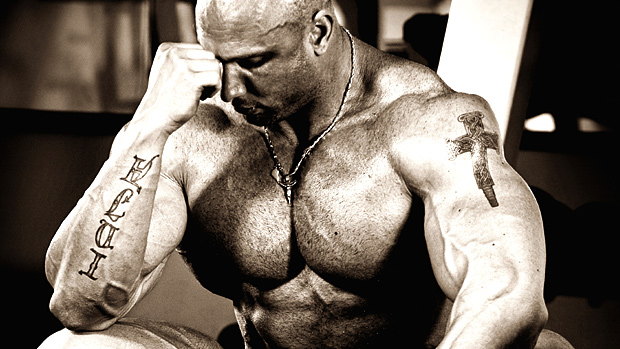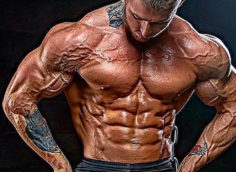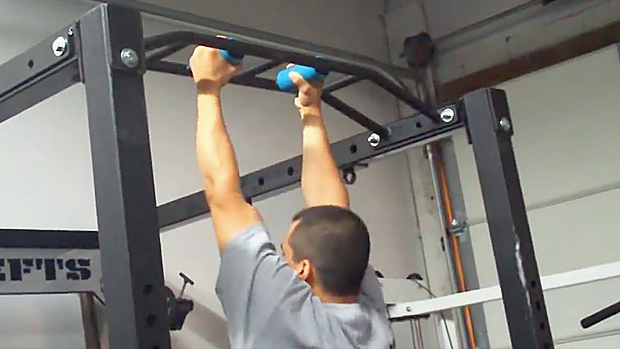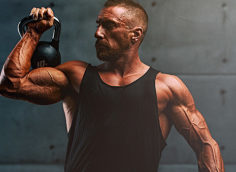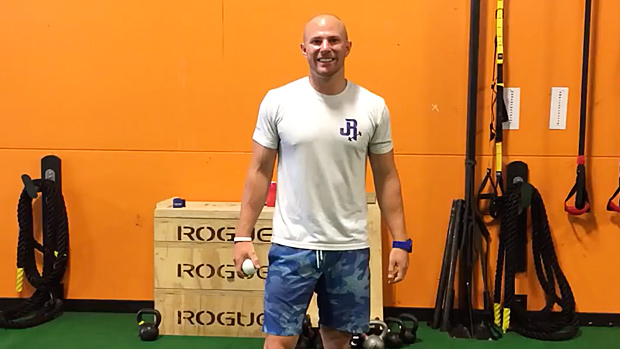The gym is supposed to be one of the few places left in the world where things make sense.
Lifting heavy iron is beautiful binary simplicity: slap a couple 45-pound plates on the Olympic bar, grab hold of the weight, and either complete the rep, or fail. There's no points for half-reps or style, no audience voting to decide your fate. Do or do not, there is no try; old Yoda was likely one hell of a powerlifter back in the day on Dagobah.
Of course, someone went and screwed it all up. Today, weight rooms that were once dingy dungeons of iron and steel tucked in the back of old gyms are now pristinely lit 50,000 square foot "fitness centers" with juice bars, spinning classes, Yogalates and of course, more shiny chrome than a Ford factory.
When faced with a thousand different options to get your chunky butt back into fighting shape, how can you decide what's best for you? Do you just follow the herd into the next Body Pump class? Or do you start scouring eBay for a squat suit and matching bench shirt? Strength coach Tim Henriques has a quick and easy checklist called the Exercise Gauntlet to help you make the decision that's best for you. – Bryan Krahn
You know it, I know it. There's a ton of fluff out there. The fitness world is filled with gadgets and gimmicks that all promise rapid results but fail to deliver, if the ever-expanding size of the average North American's backside is any indication.
Yet every year, a bunch of new toys are snatched up by well meaning trainers and fitness enthusiasts, only to be discarded or relegated to the already overcrowded basement rec room to make room for the next big thing.
Most old school guys tend to be cautiously skeptical of any new equipment or methodologies that come about; a sound practice, for the most part. However, even the most jaded, grizzled gym vet would be wise not to just outright disregard everything new, as the odd new doo-hickey has some usefulness (hello, Fat Gripz) and no trainee regardless of age should ever let him or herself fall behind the curve.
This article is to help you wade through the ever-expanding number of possible exercises and fitness activities at your disposal by introducing you to the Exercise Gauntlet, a list of questions designed to help you determine if a new exercise will really help you increase your strength, size, or physical performance.
Run a new exercise or even an old one you have been doing for a while through this list and see how it comes out. You'll know at the end whether it's worthy of your time or if it's the next Shake Weight.
1 – How hard is it?
The first question is simple. How difficult is the exercise or activity in question? In the fitness world (as with most things worth doing), it's usually the harder, the better. In other words, if it's easy to do, it's almost for sure not worth your time.
To change the body you must force it to adapt, force being the key word. If that element is missing, then the exercise will most likely do little to increase strength, size, or performance.
For example, for an untrained person, properly full squatting just an empty bar is often a difficult task. But leg extensions with a 100 pounds or more can be performed with relative ease and while reading the Sunday sports section. Which exercise do you think would be the most result producing in the long run?
2 – How long will the exercise take to master?
Something that's worth doing might be easy to do at a basic level but will take a long time to master. You can learn to bench press in 10 minutes and be blasting off reps with 95 pounds in no time, but it will take you years, upwards of a decade even to surpass the 400-pound barrier, if you ever reach it at all. Contrast this with the typical gym chest press machine, which your average high school senior can "stack" within months. Which exercise do you think is more effective?
Martial arts are another example. To become a black belt requires years of practice and sparring, and many black belts still never stop learning. Not surprisingly, most martial arts are considered to be among the best forms of exercise you can pick up.
Truth is, if you can master an activity in a few months or less then it's probably not that beneficial.
3 – Once I get good at that exercise, what else will I be good at?
If a trainee is good at the exercise you're evaluating, what else are they automatically good at? This refers to the Transfer of Skill, meaning the skills developed in one exercise will transfer over to another activity.
The squat is a good example of an exercise that has a high level of skill transfer. If you can squat 500 pounds, you can bet your fanny pack that you're good at the leg press, leg extension, and leg curl; fact is, you'll likely kick ass at the majority of leg exercises available even if you've never done them before.
However, just because you can leg press 900 pounds doesn't automatically mean that you can squat a lot, and if you don't ever perform squats, odds are that you'll have a tough time the next time you attempt them. Therefore, in this case the leg press does not have a very good transfer of skill over to the squat (or some might argue, to sports in general).
Gymnastics is another example. It takes the athletes years to be able to perform the complicated routines you see them pull off during the Olympics, but once they've reached that level of proficiency they're able to perform many other challenging physical activities as well.
So the next time you're considering adding that new inner-thigh machine to your repertoire, ask yourself, "Once I master this exercise, what else will I excel at?"
4 – What results will the exercise give?
Analyze the exercise and ask yourself what kind of results you can expect from this exercise. It's logical to assume that a lateral raise might be able to increase the size of your middle delts, but it's unlikely that it will have much of an impact on your bench press, and it's sure not going to do a thing for your squat.
Contrast this with a shoulder press or even a dumbbell external rotation, both of which can be used to improve bench press scores along with increasing the size, strength, and health of the shoulders.
That trainer with the faux hawk at Planet Fitness may have some cool looking Bosu Ball exercises, but before you hop on the bandwagon, ask yourself what results do you think you'll derive from those exercises?
5 – If you could just perform this one exercise, how would that benefit your fitness level?
Here's the scenario: your plane crashes on a desert island. You have no computer, no cell phone, and no Jessicas (Biel, Simpson, and Alba all took an earlier flight). In short, it's a truly shitty situation. Since procreating or mock-procreating is out of the question, if you're only able to perform one exercise and this was the one you choose, what would happen to you?
For example, if you could only squat or only deadlift, you'd still make good progress in your fitness program. But if you could only do bodyweight Power Plate Squats (standing on a vibrating machine and squatting) or only use a Body Blade (which, according to their website, "Tones the muscle and rounds it, but doesn't over develop it"), your fitness level may not make the progress you want it to, to put it mildly.
Obviously, this is a highly restrictive method of evaluation as no actual program would ever consist of just one exercise. Yet with so many options available for a limited number of spots in your routine, it pays to put your emphasis on items that can single-handedly deliver results. Combine this with some specific exercises for weak points and/or corrective work and you've got a kick-ass program.
Although, that Shake Weight may make all the alone time on that Jessica-less desert island a little more bearable...
6 – How important is the exercise to you?
This final question is one only you can answer. What value does the specific exercise have to you? If it's an important exercise to you, whether some Testosterone contributor or anyone else thinks it's valuable, by all means do it.
One of my colleagues told me his goal was to be able to carry two heavy cement block objects the length of a field near his house, similar to a Farmer's Walk. I thought that was pretty cool. Others may want to bench 225 pounds for their age in years, or simply out-sprint their kid.
Chances are, if the exercise or activity is that valuable to you, it'll have some of the inherent traits that we're looking for. Jim Wendler put it best when he said when considering an exercise to simply ask, "Is it awesome?" If the answer is yes, chances are you should be doing it.
Putting It To The Test
Confused yet? I don't blame you. Here are a few different examples to help clarify this list.
Evaluating an exercise
One day I walked into the gym to find one of my friends doing lateral raises with 25-pound dumbbells while standing on a Physioball (not a Bosu Ball). I was quite impressed as that's something I definitely can't do, so of course my competitive side immediately wanted to try it. But before I devoted a year of my life to Physioball lateral raises, I ran the exercise through my battery of questions.
- Is it hard? Absolutely. Standing on a Physioball is hard by itself, doing it while performing lateral raises would be even harder.
- How long would it take to master? I wasn't sure, considering my balance on those kind of circus drills is so-so at best. I'd say three months minimum, maybe six months or so as a conservative estimate.
- Once I get good at that exercise, what else will I be good at? This was the kicker for me. I asked my friend, after expressing my admiration for what he was doing, how much he could lateral raise standing on the ground. He said about 30 lbs. Suddenly I wasn't so impressed, as I could already do more than that. So it became clear that what was impressing me wasn't my friend's strength in the lateral raise, but really his balancing ability on the ball.
- What results will I get? Well, I'll probably get a little better at balance, although balance is somewhat specific to the given activity. Since I could already lift that weight I wouldn't expect any significant muscular or strength changes, which is the primary reason why I lift weights in the first place.
- If I could just perform that one exercise, would I want to do that one? Not a chance. Even when I was initially impressed with the exercise, I never thought it deserved to be a top tier exercise. No "Physioball lateral raise day" in this guy's workout journal.
- How important is that exercise to me? Personally, ball lateral raises wouldn't be important to me unless they can help me get bigger and stronger, and considering my friend's results, it doesn't appear to be beneficial in that regard.
So what's the bottom line on ball lateral raises? Interesting, kind of cool exercise, but for one who's focus is primarily strength and size it doesn't hold that much appeal.
Evaluating a sport
Let's expand the example by evaluating a sport, in this case a sport very near and dear to my heart: powerlifting.
- Powerlifting is very hard.
- It takes forever to master.
- If you're good at it, you can expect to be good at almost any non-retarded exercise you can find in the gym.
- You'll get bigger, stronger, faster, and perform better, especially if combined with skill or sport training of some kind.
- If you just did the Big 3 (squats, deadlifts, and bench presses), you'd still get impressive results.
- And to me, powerlifting is extremely important and a big part of my life. Strength sports like Olympic lifting and strongman events all have a similar intrinsic value to them. In other words, powerlifting is unapologetically awesome.
Obviously, my massive love for powerlifting shows in my responses, but that's the point. Where your passion lies plays a big role in whether an activity is a good choice for you.
Let's get out of the weight room entirely and evaluate a different kind of sport. Perhaps you strive to be the next Georges St. Pierre? How would MMA stack up?
- It's hard? Yep.
- It takes forever to master? Pretty much.
- If you're good at it, will you be good at anything else? Absolutely.
- Results? Get good at it and you'll likely be leaner, faster, in better condition, more flexible, and can finally shit-kick that bully who used to take your lunch money back in fourth grade. (Hey, some grudges never die.)
- If you just practiced MMA for the rest of your life, you'd likely be in great shape and have favorable health markers well into your golden years, not to mention sport the meanest set of cauliflower ears in the old folks' home.
- And finally, if you love it, MMA is pure awesome. Therefore, it's a great choice for you. Truth is, passion makes or breaks your decision.
Wrap-Up
We live in a world full of distractions, and it's hard for many folks not to get swayed by the masses and jump on the latest and greatest exercise fad. Please, don't waste your time chasing after every new thing in fitness. When faced with a new exercise, sport, or hobby, simply run it through the Exercise Gauntlet; if you're still excited about the activity afterwards, you can rest assured that it's probably a valid activity for you.

